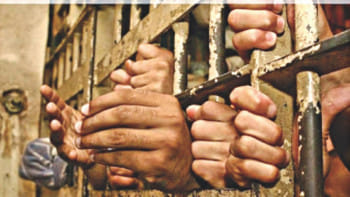Still in Myanmar prison even after serving time
On a quest to change his fortune, Salamat Ullah left his home in Teknaf for Malaysia in October last year.
Refugee Camps: Killings, narco crimes on rise
Crimes, particularly those related to narcotics and murders, have witnessed a significant rise inside the Cox’s Bazar Rohingya camps over the last seven months.
EU to keep the pressure on Myanmar
The EU will continue to support the Rohingya people for their right to return to their homeland, said Eamon Gilmore, the EU’s special representative for human rights.
Rohingya Return: Verification begins for first batch
Amid mounting global pressure, a 17-member Myanmar delegation yesterday started verifying the identities of the Rohingya refugees in Teknaf, as the first group of Myanmar’s displaced people is expected to be repatriated in a few months.
ARSA behind the recent murders in Rohingya camps
Amid the armed conflicts along the border over the last two months, gang members living in the no-man’s-land entered Bangladesh and engaged in criminal activities, including murders, at the refugee camps, police and locals said.
Gunfire, shelling again on Myanmar side of border
Panic grips the locals in bordering areas of Cox’s Bazar’s Whaikhyang and Bandarban’s Tambru, as heavy gunfire and intermittent shelling on the Myanmar side have been heard again after a pause of 10 days.
Gunshots now heard from Ukhiya
As firing and mortar shelling in Myanmar were now heard from Ukhiya border of Cox’s Bazar yesterday, the local authorities warned the boat owners of not carrying Rohingyas amid fear of their fresh entry.
Tensions in Ghumdhum: 300 families ‘to be moved’
Amid incessant gunfire and mortar shelling in Myanmar close to the Bangladesh border, the local administration is planning to evacuate around 300 families in Ghumdhum union of Bandarban’s Naikhongchhari upazila.
Still in Myanmar prison even after serving time
On a quest to change his fortune, Salamat Ullah left his home in Teknaf for Malaysia in October last year.
Refugee Camps: Killings, narco crimes on rise
Crimes, particularly those related to narcotics and murders, have witnessed a significant rise inside the Cox’s Bazar Rohingya camps over the last seven months.
EU to keep the pressure on Myanmar
The EU will continue to support the Rohingya people for their right to return to their homeland, said Eamon Gilmore, the EU’s special representative for human rights.
Rohingya Return: Verification begins for first batch
Amid mounting global pressure, a 17-member Myanmar delegation yesterday started verifying the identities of the Rohingya refugees in Teknaf, as the first group of Myanmar’s displaced people is expected to be repatriated in a few months.
ARSA behind the recent murders in Rohingya camps
Amid the armed conflicts along the border over the last two months, gang members living in the no-man’s-land entered Bangladesh and engaged in criminal activities, including murders, at the refugee camps, police and locals said.
Gunfire, shelling again on Myanmar side of border
Panic grips the locals in bordering areas of Cox’s Bazar’s Whaikhyang and Bandarban’s Tambru, as heavy gunfire and intermittent shelling on the Myanmar side have been heard again after a pause of 10 days.
Gunshots now heard from Ukhiya
As firing and mortar shelling in Myanmar were now heard from Ukhiya border of Cox’s Bazar yesterday, the local authorities warned the boat owners of not carrying Rohingyas amid fear of their fresh entry.
Tensions in Ghumdhum: 300 families ‘to be moved’
Amid incessant gunfire and mortar shelling in Myanmar close to the Bangladesh border, the local administration is planning to evacuate around 300 families in Ghumdhum union of Bandarban’s Naikhongchhari upazila.
5 Years of rohingya influx: A sense of unease growing among locals
Five years ago, they were the first to welcome with open arms the thousands of Rohingyas fleeing persecution in Myanmar, setting an example of how compassionate our society is here in Bangladesh.
Longing for home: 5th anniversary of Rohingya influx
For Shamsul Ahmed, life in the Rohingya refugee camp is now much better than it was five years ago, but his heart longs for home.

















